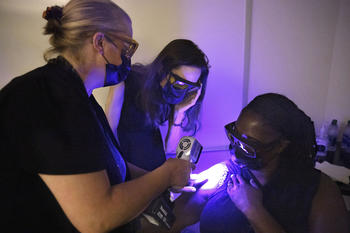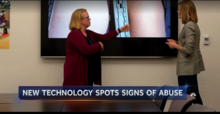In This Story
Ruth Glenn
President of Survivor Justice Action
George Mason University Receives $4.85 Million Gift to Increase Intimate Partner Violence Detection and Reporting
FAIRFAX, VA (March 5, 2024) – George Mason University today announced an anonymous $4.85 million gift to advance groundbreaking research on bruise and injury detection for individuals who experience interpersonal violence. The funding will help develop new tools in imaging technology using a light source that is five times better than white light for identifying and visualizing bruising across all skin tones for use by forensic nurses, social service providers, and law enforcement.
“This single largest gift to support research in the College of Public Health’s history underscores Mason faculty’s leadership in life-changing work affecting those who experience interpersonal violence,” said Melissa J. Perry, Dean of the College of Public Health. “A gift of this magnitude brings transformative resources to Mason’s cross-disciplinary research and collaborative approach that takes ground-breaking research to new heights with the potential for greater use and impact.”
Mason’s acclaimed interdisciplinary research in using Alternate Light Sources for bruise detection, as featured on NBC Nightly News, is led by Katherine Scafide, David Lattanzi, and Janusz Wojtusiak. The funding will expand the team’s bruise detection system that leverages artificial intelligence (AI), imaging and light technologies, forensic reports, and clinical expertise to increase data collection and access to care for trauma victims. The technology can be used across all skin tones and responds to deficits in the identification of physical injuries particularly among people with darker skin tones.

"By improving documentation of physical trauma, we hope to address disparities in clinical care which can lead to improved healthcare for all as well as legal recourse for all survivors of violence," said Scafide, forensic nurse, research leader, and Associate Professor of Nursing in Mason’s College of Public Health. “This gift expands Mason’s leadership in developing new technologies to empower vulnerable communities.”
One in 3 women worldwide experience physical trauma at the hands of an intimate partner or stranger. In the United States, over 10 million women and men grapple with intimate partner violence each year. Among domestic violence survivors, bruises and soft tissue trauma are the most reported injuries. When injuries are accurately documented, survivors are more likely to participate in the criminal justice process, according to recent studies on interpersonal violence and reporting. In addition, family and partner violence and elder abuse can lead to a host of other public health issues such as infectious and noninfectious diseases, mental health trauma, and reproductive health problems.
"A vital piece to success is ensuring that any AI tool has access to in-depth data from all skin tones and skin characteristics alongside human expert analysis,” said Lattanzi, associate professor in the Sid and Reva Dewberry Department of Civil, Environmental, and Infrastructure Engineering in the College of Engineering and Computing.
Supporters working on ending domestic violence commended the announcement.
Ruth Glenn, President of Survivor Justice Action, applauds the groundbreaking work led by Dr. Katherine Scafide at George Mason University, harnessing alternate light source (ALS) technology to support and uplift the needs of domestic violence survivors. “In a nation where domestic violence disproportionately impacts communities of color, this innovative research holds immense promise. By prioritizing inclusivity and recognizing the unique challenges faced by survivors with darker skin tones, Scafide's research aligns seamlessly with our vision to end domestic violence in our lifetime. Continued research on this technology not only has the potential to revolutionize the identification of bruising in diverse populations but also signifies a vital step toward justice and empowerment for those who have long been marginalized. Survivor Justice Action stands firmly in support of initiatives that demand systems change and establish resources for survivors and advocates.”
“The Scafide team’s research and findings are revolutionizing medical forensic examinations. The ability for medical professionals to visualize and identify previously ‘invisible’ injury substantively advances quality medical assessment and patient care. Visibility and documentation of trauma/ injury provide valuable forensic corroboration for law enforcement and the courts to hold offenders accountable,” said Ann Burdges, CEO of End Violence Against Women International.
This project is led by Mason’s College of Public Health in collaboration with the College of Engineering and Computing. More information on the study can be found at bruise.gmu.edu.
About George Mason University
George Mason University is Virginia’s largest public research university. Located near Washington, D.C., Mason enrolls more than 40,000 students from 130 countries and all 50 states. Mason has grown rapidly over the past half-century and is recognized for its innovation and entrepreneurship, remarkable diversity, and commitment to accessibility. In 2023, the university launched Mason Now: Power the Possible, a one-billion-dollar comprehensive campaign to support student success, research, innovation, community, and stewardship. Learn more at gmu.edu.
About the College of Public Health at George Mason University
The College of Public Health at George Mason University is the first College of Public Health in Virginia combining public health transdisciplinary research, education, and practice in the Commonwealth as a national exemplar. The College enrolls more than 1,900 undergraduate and 1,300 graduate students in our nationally recognized programs, including six undergraduate degrees, eight master’s degrees, five doctoral degrees, and six professional certificate programs. The College is comprised of the School of Nursing and the Departments of Global and Community Health, Health Administration and Policy, Nutrition and Food Studies, and Social Work. The College’s transdisciplinary research seeks to understand the many factors that influence the public’s health and well-being throughout the lifespan, from the cell structures to the policy decisions. Areas of focus include environmental exposures, pregnancy outcomes, youth risk behavior, interpersonal violence, infectious disease, nutrition, mental and behavioral health, inequality and populations that are marginalized, health informatics, health policy, and novel methods for causal inference. With more than 500 partners, the College serves the community and engages our students through research, practice, and clinical care.
About the College of Engineering and Computing (CEC)
The College of Engineering and Computing (CEC) is a fast-growing force for innovation in research and education. Ranked nationally in the top 100 in both undergraduate and graduate education, the CEC enrolled a record high of 10,933 students in fall 2023. The college has 34 undergraduate, master’s and doctoral degree programs including several first-in-the-nation offerings. As part of a nationally ranked research university, CEC research teams expended $65 million in sponsored research awards in the past year and had projects with over $119 million in current and anticipated awards. The college stands out for its leading research in areas such as artificial intelligence, data analytics engineering, cybersecurity engineering, biomedical imaging and devices, healthcare, autonomous systems, 5G/Next G communications, systems architectures, computational biomedicine, advanced materials and manufacturing, sustainable infrastructure, and more.

